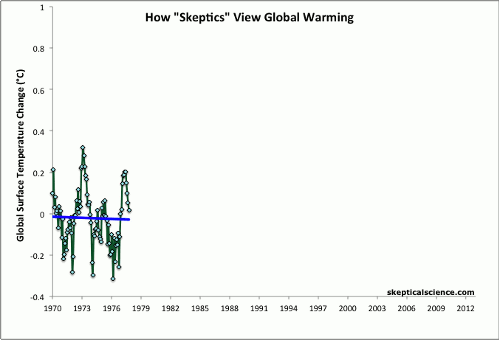Temperatures Continue Up the Escalator
Posted on 8 January 2013 by dana1981
The Escalator has been one of Skeptical Science's most popular features since its inception just over one year ago. Over the past year, it has been used in many climate myth debunkings, mainstream media stories, and most recently was even used by Senator Sheldon Whitehouse on the floor of the US Senate (the full transcript of the Senator's excellent speech can be viewed here).
The Escalator was also featured in the PBS documentary Climate of Doubt. Both of these videos are hosted on the SkS YouTube channel.
And The Escalator was also featured in the rebuttals to the 2012 Golden Horseshoe Award (formerly the BS Award).
Bob Tisdale recently suggested some sort of Escalator-related impropriety because when he attempted to re-create the graphic, the slopes he found for the 'steps' were different than in the SkS version. The reason for this is quite simple, the surface temperature dataset analysis methodologies are periodically revised, and Tisdale was using newer versions than were used in the previous Escalator graphics.
Below is an updated version of The Escalator using the most recent surface temperature datasets as of late December 2012, updated to include the monthly data through November 2012. The timeframes for each 'step' are listed in the figure caption, and each step is the linear trend between those points.
Average of NASA GISS, NOAA NCDC, and HadCRUT4 monthly global surface temperature anomalies from January 1970 through November 2012 (green) with linear trends applied to the timeframes Jan '70 - Oct '77, Apr '77 - Dec '86, Sep '87 - Nov '96, Jun '97 - Dec '02, and Nov '02 - Nov '12.
The global surface temperature trend from January 1970 through November 2012 (the red line) is 0.16°C per decade.
The Escalator page now also has links to images of the first and last frames, as well as the 'steps' and long-term trend combined in a single image.
Our hope is that the popularity of the Escalator will decline as a result of climate contrarians abandoning the absurd myth that global warming has stopped. Then again, John Cook thought that Skeptical Science would be obsolete by now due to global warming denial becoming an untenable belief, so we suspect The Escalator will continue to be a useful myth debunking tool for some time to come, particularly since climate contrarians seem to prefer nitpicking the graphic to learning from it.































 Arguments
Arguments































I didn't argue the latest 15 year trend was statistically significant (not for SAT anyway), however as this warming pause gets longer it may become so soon.